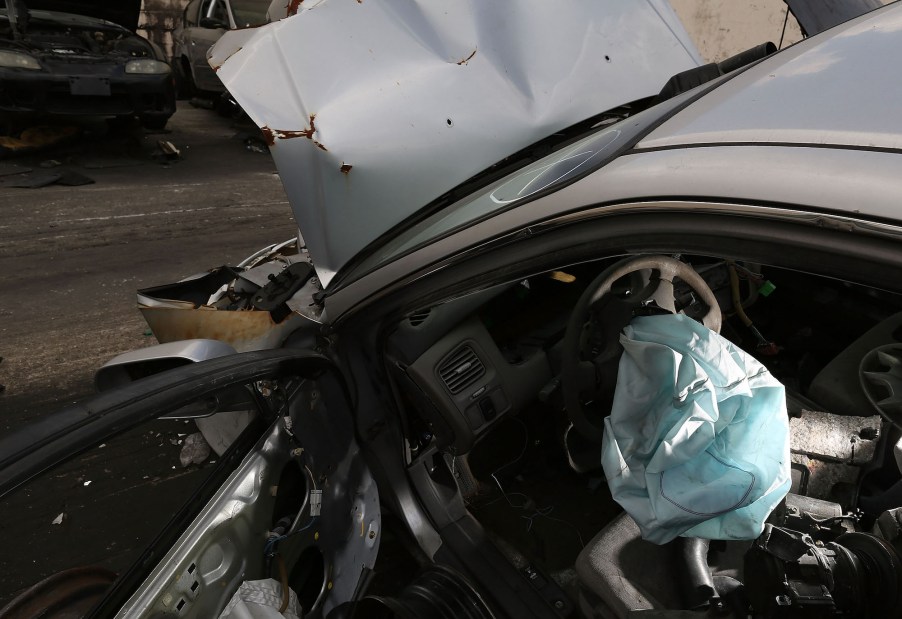
Exploding Takata Airbag Kills a Honda Accord Driver in a Horrific Way
Recalls occur in every industry, and most automakers have issued at least one. Many consumers ignore recalls, but when they do, they’re putting themselves in danger. Some recalls result from threats to rider safety so severe they can prove deadly. Such has been the case with the infamous Takata airbag recall, which in January claimed another fatality. A Honda Accord driver was killed by a faulty airbag that could’ve been replaced had the owner heeded the recall notice.
The Takata airbag recall
Takata, a major auto parts supplier, has produced airbags, among other parts, for decades. However, the company’s airbags installed in cars between 2002 and 2015 were found to be compromised. When deployed during a crash, the deflator housing could rupture, spraying shrapnel everywhere, including into vehicle occupants.
According to Consumer Reports, faulty Takata airbags’ explosive deployment has killed 19 people in the United States and 27 worldwide. In addition, 400 U.S. residents have sustained injuries. More casualties might’ve occurred if not for a massive recall effort that now comprises 42 million vehicles in the States alone. The action involves replacing 67 million airbags with new ones.
This defect poses a higher risk for some vehicles more than others. For example, 2001 to 2003 Honda and Acura vehicles with “alpha airbags” are at “extreme risk.” The 1999 BMW 323i and 328i, 2006 Mazda B-Series Pickup, and 2006 Ford Ranger are also in this category. Owners should stop driving these vehicles immediately and take them to the nearest dealership for repairs.
Recall challenges
Every recall is challenging, but a recall as far-reaching as this one has proven extraordinarily complex. Drivers routinely miss recall orders, despite manufacturers’ best efforts to advertise them and provide repairs free of charge. More often, drivers ignore them, not wanting to deal with the inconvenience of temporarily losing access to their vehicle.
Manufacturers have faced both challenges, and many did not immediately issue recall notices. Some have been prompted by bad publicity, including a damning report that Takata was aware of this defect and its potential consequences yet continued to supply automakers with airbags anyway.
Further, as safety regulators, such as the National Highway Traffic Safety Administration (NHTSA), have gradually expanded the national recall notice to include more vehicles, automakers have been forced to decide how quickly they would comply with the orders. Not every manufacturer has immediately complied, driven by some combination of reputational and legal risk mitigation and the simple challenge of repair.
Compounding the problem further is that automakers who recall their vehicles must handle the logistics of fixing each car. That means ordering a new airbag and replacing it when affected vehicles arrive at the dealership. This also results in a run on available airbags, leading to supply issues, as airbag suppliers must manufacture enough replacement parts and continue producing them for new vehicles.
Takata’s efforts to mislead
The supply chain issue has severely hampered the Takata airbag recall. Manufacturers have had to take longer than usual to replace or repair airbags as drivers have complied with the notice. Another complication? Since the beginning of the recall in 2008, Takata obstructed investigatory efforts to determine the breadth of the problem.
By the end of 2014, the recall included 6 million vehicles. However, by November of that year, The New York Times cited internal documents from 2004, noting Takata knew the severity of the problem. Within a couple of months, the NHTSA began fining the company daily for non-cooperation with its investigation. And by the middle of 2015, the U.S. Department of Transportation announced the recall needed to expand to nearly 34 million vehicles.
By this point, seven people had died as a result of these faulty airbags. Six years and a dozen more deaths later, the recall had again grown to its current number of 67 million airbags. By this time, Takata, facing multiple civil lawsuits and regulatory penalties, had filed for bankruptcy protection, with its revenue and reputation in tatters.
To date, more than 50 million airbags have been replaced. Still, millions more remain unaccounted for. Despite dealer communications to drivers, including mailers, phone calls, and visits, as well as considerable publicity, some drivers have yet to return their vehicles for repairs.
The latest tragedy
Unfortunately, a 2002 Accord owner ignored those efforts and never had the sedan’s airbags replaced. Honda said it tried to contact the owner over 100 times. The final attempt was a mailer in November 2020. But those efforts were in vain.
As a result, the 19th U.S. victim — who did not own the vehicle — tragically lost his life in South Carolina this past January. He was 35-year-old Rekeyon Barnette, local CBS affiliate WBTV reported.
“The driver of the vehicle sustained injuries from the ruptured inflator and subsequently died,” Honda said in an April 21 statement. “Our thoughts and deepest sympathies are with the family of the driver.”
Honda’s confirmation that the faulty airbag caused Barnette’s death is of little consolation to his widow. “Obviously, she’s been grieving, but there was a limited sense of relief,” the family’s attorney, Bob Cook, told WBTV. “But it doesn’t bring him back, and it doesn’t make it any easier for her.”
Cook said that when Barnette crashed, the airbag’s “canister lid shot out at him, right into his mouth, and got stuck in his throat. That is what killed him,” WBTV reported.
So if you own a Honda or Acura vehicle, especially a 2001 to 2003 model, check its recall status at recalls.honda.com or recalls.acura.com. Fixing your vehicle could prevent a tragedy.


